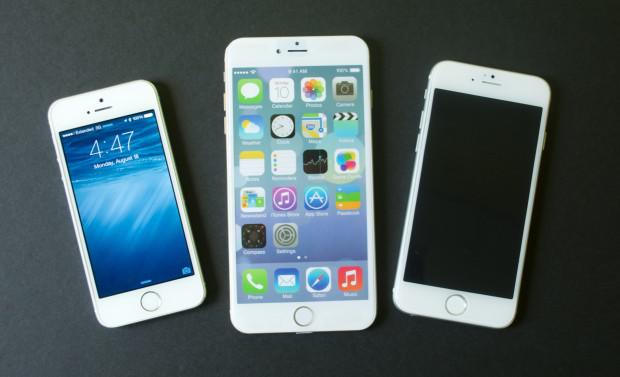963
10 ways in which technologies have forever changed the way we think
The real danger is not that computers will begin to think like men, and that people will begin to think like kompyutery
Nowadays, people already can not imagine life without the incredible miracle of technology and devices that half a century ago have met only on the pages of science fiction novels. Computers, social networks, digital cameras, audio players, television programs - each one of us every day enjoy the fruits of technological progress, but not everyone knows how to affect them gadgets and huge amounts of information. Among the side effects of science and technology has both positive and negative, to your attention - Ten amazing examples of the impact of technology on people's behavior and their thinking.
1. The plates have changed the idea of the perfect length pesen
Most modern songs have a duration of no more than four minutes, with the fashion for short pieces of music appeared in the late XIX-th century, when Thomas Edison invented the phonograph - a device for recording and playback. The first phonorecords could accommodate only four minutes of music, so instead of long composers of classical music began to compose a 4-minute tunes.
Gradually, the composition, the duration of which can not record them on a plate, is losing popularity, people got used to listen to short works, and long now seemed bored and tighten. Although advances in technology have the opportunity to write to media is much longer tunes, songs lasting no more than four minutes and remained the most common pieces of music.
2. With the advent of radio has increased suggestibility lyudey
In the first decades of radio experts were trying to identify how it can affect the audience. It turned out that this technology - a true gift for the creators of advertising and customers, as people tend to believe the information received on the radio much more than the information that they have learned, for example, from a conversation with the seller.
When face-to-face at the credibility of information may affect factors such as appearance or facial expressions voiced by her man at an impersonal voice heard on the radio these shortcomings, in principle, can not. Getting rid of the "extra" information related causes, that people can not relate to radio advertising is critical, so its efficiency is very high. In addition, psychologists say that while listening to the radio deteriorating cognitive abilities in general.
3. Because of the black-and-white television people see black and white sny
Some people believe that frequent TV viewing can reduce mental ability, but according to some skeptics, convincing scientific evidence that there is still no. However, the experts found that the television affect humans, albeit not as damaging as is considered, but rather unexpected way. Several years ago, Eva Murzin, a psychologist at the University of Dundee (Scotland), looking through the materials of the old studies of sleep and comparing them with their own work on the study of dreams, has found people in childhood Saw black-and-white television, are more likely to see a monochrome dreams. < br />
According to the results Eve during their experiments, about 25% of the dreams of people older than 55 years - black and white. Most of them looked black and white TVs still children, and later switched to color, but the monochrome dreams dreams they are still - in my childhood the human brain is much more susceptible to visual and other information, so the memories and impressions gained at a young age, as a rule not erased from memory, and often appear in dreams.
4. Cell phones provoke the development depressii
Like any other revolutionary gadget, mobile phones are often accused of every conceivable sin. Periodically sorts of studies devoted to say, identifying the link between cellular and the development of cancer, is a compelling argument in favor of this is not, but to prove the fact that mobile phones can cause depression.
In 2011, scientists set up an experiment in which volunteers will not part with smartphones and mobile, day or night, asked to assess his mental state with the help of questionnaires. A year later, he again offered to fill in the same questionnaire, it was found that the most active users of mobile devices have progressed depression and sleep disorders.
The researchers believe that the need for any time be ready to communicate - one of the main factors in the development of depression and stress. Permanently staying waiting for a call or message, gadzhetomany suffer from internal tension that provokes problems with sleep and impairs mental health in general.
5. The Internet is changing the technique chteniya
Internet, without a doubt - one of the greatest inventions of mankind, although its role in the history of Homo sapiens evaluated differently, some people even claim that the emergence of the World Wide Web - the beginning of the end of global people as a species. Studies of the effect of the Internet on the thinking and behavior of being not so long ago, however, based on the results experts already draw some conclusions - for example, that the network changes the technique of reading.

For thousands of years mankind has learned to read the books, seeing the sequence information, but with the development of the Internet, everything changed - now you can quickly switch between different sources, using references and keywords. Many Internet users are paying browsing each page no more than a few seconds and quickly focuses on any other topics. As a result, the reading becomes superficial, information is not deposited in the mind, as a result, changes and thinking itself.
According to Marianne Wolf, a neurologist at the University of Tufts (MA) for the conservation of productive reading skills necessary for mankind to inculcate future generations a love of reading traditional paper media.
6. Social networks increase samootsenku
Despite the negative assessment of the impact of social networks on the communication skills of people, scientists admit that in some ways they can be useful. Two researchers from the Indiana University Bloomington studied how self-esteem affects the use of one of the world's largest social networks and found that when a user creates a network a "perfect" image of himself, his self-esteem rises.
Experts claim that people form their own "improved version" for the self-satisfaction that can serve as proof of the fact that self-esteem is dependent primarily on the ability of the person to be in harmony with itself, without paying attention to the situation.
7. Hypothesis kultivatsii
Many of the most common in our time statements about the dangers of television are frankly delusional in nature and are not supported by the facts, but be that as it may, there is no doubt that television does influence the way we think. TV "picture" does not correspond to the reality around us - it identifies such things as war and crime, talks about the endemic poverty of the population of some countries and the fabulous wealth of others. Artfully filed in a certain context, facts become part of a person's world and greatly alter it by creating the impression, for example, that in any African city should go out as immediately picked up the deadly Ebola.
By studying this curious phenomenon, researchers have developed a so-called cultivation theory, which states that the more time a person spends watching television, the more likely that his picture of the world forms the content of television broadcasts. Consistency cultivation theory is supported by numerous experiments, and although some experts claim that the conditions of their conduct can not be considered blameless, as a whole it does not diminish the scientific value of the hypothesis.
8. Digital Cameras interfere enjoy zhiznyu
Several decades ago, a class photo from a man demanding the presence of certain skills and even some skill - to cope with all the subtleties of the mechanical configuration of cameras and film developing the strength is not for everyone. With the advent of a large number of affordable and easy-to-use digital cameras everyone can feel art photographer - is enough to make one movement of a finger, and then intelligent machines do everything for you, adjust focus, will select the optimal white balance, and so on. Easily make thousands of shots and then remove the bad - of the last of such photographers could only dream of! However, the use of convenient modern "SLR" showed an unexpected side effect - many visitors to concerts and other entertainment events spend more time photographing process than actually participate in the events themselves.

Steve Cockburn, of the University of Sussex, has been studying this phenomenon, it suggests that the phenomenon is due to people's desire for self-actualization by placing extremely detailed photographic reports about the events of their lives in social media. The desire to communicate their participation in any event to the greatest number of people to create a very exaggerated positive self-image, from what was mentioned above (see para. 6).
9. «Walkman» as the protection of personal prostranstva
Portable music players are among the most popular music playback device, however, have their prevalence and accessibility there is a downside - giving people the joy of listening to your favorite music anywhere and at any time, they thus deprive them of luxury communicate with each other. One of the developers of the famous players, «Walkman» feel it for yourself - while testing the first models of the player's wife complained that he began to pay less attention to it.
To provide users with normal communication with others while listening to music, the creators of «Walkman» gave the device a microphone that transmits the voice of the caller into the audio jacks and two headphones to music at the same time can enjoy the two.
These "chips" player spawned a curious phenomenon - Psychologists have noticed that sometimes easier for people to discuss personal and emotionally significant problems putting in ear earphones, even if the music at this moment does not sound. According to experts, the headphones provide that in English denote the concept «privacy» - a sense of security of personal space.
10. Video games cause to feel viny
Experts not the first debate on the impact of computer games with elements of violence on the psyche of gamers. One study state that the commission of violent and anti-social actions in virtual reality in some way beneficial effect on the moral qualities of the players, as makes them feel guilty for playing "a crime».
Of course, one understands that the "murder" and "theft" occurs in the game, but at the same time, his brain for the most part interprets them as real. After the excesses of virtual people tend to give them a moral assessment, and realize that in real life would never have gone to such. Guilt - one of the main motivators, according to the researchers, it can push a person to commit a positive behavior.
via factroom.ru

Nowadays, people already can not imagine life without the incredible miracle of technology and devices that half a century ago have met only on the pages of science fiction novels. Computers, social networks, digital cameras, audio players, television programs - each one of us every day enjoy the fruits of technological progress, but not everyone knows how to affect them gadgets and huge amounts of information. Among the side effects of science and technology has both positive and negative, to your attention - Ten amazing examples of the impact of technology on people's behavior and their thinking.
1. The plates have changed the idea of the perfect length pesen

Most modern songs have a duration of no more than four minutes, with the fashion for short pieces of music appeared in the late XIX-th century, when Thomas Edison invented the phonograph - a device for recording and playback. The first phonorecords could accommodate only four minutes of music, so instead of long composers of classical music began to compose a 4-minute tunes.
Gradually, the composition, the duration of which can not record them on a plate, is losing popularity, people got used to listen to short works, and long now seemed bored and tighten. Although advances in technology have the opportunity to write to media is much longer tunes, songs lasting no more than four minutes and remained the most common pieces of music.
2. With the advent of radio has increased suggestibility lyudey

In the first decades of radio experts were trying to identify how it can affect the audience. It turned out that this technology - a true gift for the creators of advertising and customers, as people tend to believe the information received on the radio much more than the information that they have learned, for example, from a conversation with the seller.
When face-to-face at the credibility of information may affect factors such as appearance or facial expressions voiced by her man at an impersonal voice heard on the radio these shortcomings, in principle, can not. Getting rid of the "extra" information related causes, that people can not relate to radio advertising is critical, so its efficiency is very high. In addition, psychologists say that while listening to the radio deteriorating cognitive abilities in general.
3. Because of the black-and-white television people see black and white sny

Some people believe that frequent TV viewing can reduce mental ability, but according to some skeptics, convincing scientific evidence that there is still no. However, the experts found that the television affect humans, albeit not as damaging as is considered, but rather unexpected way. Several years ago, Eva Murzin, a psychologist at the University of Dundee (Scotland), looking through the materials of the old studies of sleep and comparing them with their own work on the study of dreams, has found people in childhood Saw black-and-white television, are more likely to see a monochrome dreams. < br />
According to the results Eve during their experiments, about 25% of the dreams of people older than 55 years - black and white. Most of them looked black and white TVs still children, and later switched to color, but the monochrome dreams dreams they are still - in my childhood the human brain is much more susceptible to visual and other information, so the memories and impressions gained at a young age, as a rule not erased from memory, and often appear in dreams.
4. Cell phones provoke the development depressii

Like any other revolutionary gadget, mobile phones are often accused of every conceivable sin. Periodically sorts of studies devoted to say, identifying the link between cellular and the development of cancer, is a compelling argument in favor of this is not, but to prove the fact that mobile phones can cause depression.
In 2011, scientists set up an experiment in which volunteers will not part with smartphones and mobile, day or night, asked to assess his mental state with the help of questionnaires. A year later, he again offered to fill in the same questionnaire, it was found that the most active users of mobile devices have progressed depression and sleep disorders.
The researchers believe that the need for any time be ready to communicate - one of the main factors in the development of depression and stress. Permanently staying waiting for a call or message, gadzhetomany suffer from internal tension that provokes problems with sleep and impairs mental health in general.
5. The Internet is changing the technique chteniya

Internet, without a doubt - one of the greatest inventions of mankind, although its role in the history of Homo sapiens evaluated differently, some people even claim that the emergence of the World Wide Web - the beginning of the end of global people as a species. Studies of the effect of the Internet on the thinking and behavior of being not so long ago, however, based on the results experts already draw some conclusions - for example, that the network changes the technique of reading.

For thousands of years mankind has learned to read the books, seeing the sequence information, but with the development of the Internet, everything changed - now you can quickly switch between different sources, using references and keywords. Many Internet users are paying browsing each page no more than a few seconds and quickly focuses on any other topics. As a result, the reading becomes superficial, information is not deposited in the mind, as a result, changes and thinking itself.
According to Marianne Wolf, a neurologist at the University of Tufts (MA) for the conservation of productive reading skills necessary for mankind to inculcate future generations a love of reading traditional paper media.
6. Social networks increase samootsenku

Despite the negative assessment of the impact of social networks on the communication skills of people, scientists admit that in some ways they can be useful. Two researchers from the Indiana University Bloomington studied how self-esteem affects the use of one of the world's largest social networks and found that when a user creates a network a "perfect" image of himself, his self-esteem rises.
Experts claim that people form their own "improved version" for the self-satisfaction that can serve as proof of the fact that self-esteem is dependent primarily on the ability of the person to be in harmony with itself, without paying attention to the situation.
7. Hypothesis kultivatsii

Many of the most common in our time statements about the dangers of television are frankly delusional in nature and are not supported by the facts, but be that as it may, there is no doubt that television does influence the way we think. TV "picture" does not correspond to the reality around us - it identifies such things as war and crime, talks about the endemic poverty of the population of some countries and the fabulous wealth of others. Artfully filed in a certain context, facts become part of a person's world and greatly alter it by creating the impression, for example, that in any African city should go out as immediately picked up the deadly Ebola.
By studying this curious phenomenon, researchers have developed a so-called cultivation theory, which states that the more time a person spends watching television, the more likely that his picture of the world forms the content of television broadcasts. Consistency cultivation theory is supported by numerous experiments, and although some experts claim that the conditions of their conduct can not be considered blameless, as a whole it does not diminish the scientific value of the hypothesis.
8. Digital Cameras interfere enjoy zhiznyu

Several decades ago, a class photo from a man demanding the presence of certain skills and even some skill - to cope with all the subtleties of the mechanical configuration of cameras and film developing the strength is not for everyone. With the advent of a large number of affordable and easy-to-use digital cameras everyone can feel art photographer - is enough to make one movement of a finger, and then intelligent machines do everything for you, adjust focus, will select the optimal white balance, and so on. Easily make thousands of shots and then remove the bad - of the last of such photographers could only dream of! However, the use of convenient modern "SLR" showed an unexpected side effect - many visitors to concerts and other entertainment events spend more time photographing process than actually participate in the events themselves.

Steve Cockburn, of the University of Sussex, has been studying this phenomenon, it suggests that the phenomenon is due to people's desire for self-actualization by placing extremely detailed photographic reports about the events of their lives in social media. The desire to communicate their participation in any event to the greatest number of people to create a very exaggerated positive self-image, from what was mentioned above (see para. 6).
9. «Walkman» as the protection of personal prostranstva

Portable music players are among the most popular music playback device, however, have their prevalence and accessibility there is a downside - giving people the joy of listening to your favorite music anywhere and at any time, they thus deprive them of luxury communicate with each other. One of the developers of the famous players, «Walkman» feel it for yourself - while testing the first models of the player's wife complained that he began to pay less attention to it.
To provide users with normal communication with others while listening to music, the creators of «Walkman» gave the device a microphone that transmits the voice of the caller into the audio jacks and two headphones to music at the same time can enjoy the two.
These "chips" player spawned a curious phenomenon - Psychologists have noticed that sometimes easier for people to discuss personal and emotionally significant problems putting in ear earphones, even if the music at this moment does not sound. According to experts, the headphones provide that in English denote the concept «privacy» - a sense of security of personal space.
10. Video games cause to feel viny

Experts not the first debate on the impact of computer games with elements of violence on the psyche of gamers. One study state that the commission of violent and anti-social actions in virtual reality in some way beneficial effect on the moral qualities of the players, as makes them feel guilty for playing "a crime».
Of course, one understands that the "murder" and "theft" occurs in the game, but at the same time, his brain for the most part interprets them as real. After the excesses of virtual people tend to give them a moral assessment, and realize that in real life would never have gone to such. Guilt - one of the main motivators, according to the researchers, it can push a person to commit a positive behavior.
via factroom.ru























